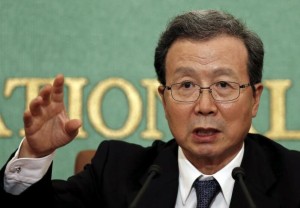Japanese Prime Minister Shinzo Abe needs to clearly express remorse for his nation’s World War II actions or risk “rubbing salt in the wounds” of those who suffered, China’s ambassador to Japan said on Thursday.
Cheng Yonghua, China’s ambassador to Japan, warned Japan not to backtrack on previous government statements and said China was keenly waiting, particularly to see if he expressed remorse toward those who suffered from Japan’s actions.
“If the statement is deliberately made vague, or if it lightens responsibility, it will once again rip open the wounds of China and the other victims, and rub salt in them,” Cheng said at a news conference in Tokyo.
Ties between the Asian neighbors have long been fraught due to China’s memories of Japan’s wartime aggression, but relations improved following meetings between Abe and Chinese President Xi Jinping over the last year. Japanese government sources say another summit could well take place this year.
Some also say China first wants to see a planned statement by Abe marking the 70th anniversary of the war’s end, amid concerns he may dilute past government apologies.
In landmark 1995 comments known as the Murayama Statement, Prime Minister Tomiichi Murayama made a “heartfelt apology” for the wartime damage and suffering caused by Japan.
Abe has repeatedly said that he will express remorse in the statement, expected out shortly before the Aug. 15 anniversary of the war’s end, but that he will not issue a fresh apology – despite a recent poll by Kyodo news agency that found 67 percent of respondents thought he should.
The Chinese ambassador also lashed back at concerns raised by Japan over Chinese oil and gas exploration in the East China Sea. Japan said it was concerned about Chinese oil and gas exploration in the region, even though none of it is being done in disputed waters.
Cheng said Japanese concerns the drilling might end up raiding oil and gas in neighboring Japanese territory is “groundless.”
Story compiled with information by CRI English and Reuters.
 CGTN America
CGTN America Cheng Yonghua, Chinese Ambassador to Japan, speaks during a news conference at Japan National Press Club in Tokyo July 23, 2015. REUTERS/Issei Kato
Cheng Yonghua, Chinese Ambassador to Japan, speaks during a news conference at Japan National Press Club in Tokyo July 23, 2015. REUTERS/Issei Kato
